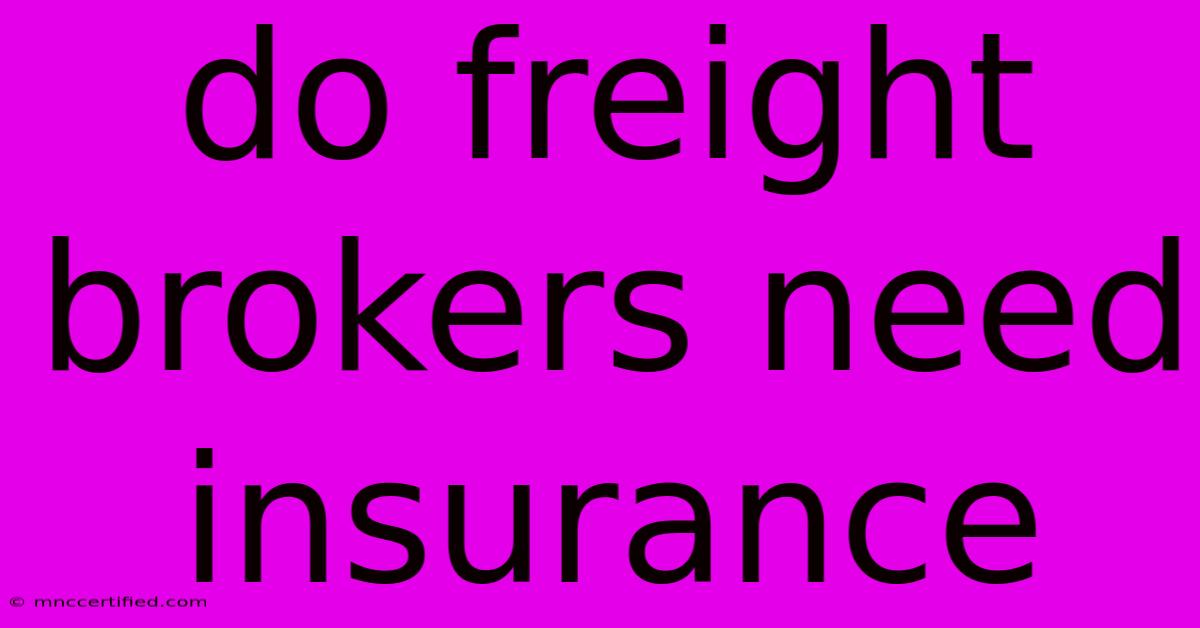Do Freight Brokers Need Insurance

Table of Contents
Do Freight Brokers Need Insurance? A Comprehensive Guide
The trucking industry is complex, and for freight brokers navigating this landscape, the right insurance is paramount. The short answer is: yes, freight brokers absolutely need insurance. But the type and amount of insurance needed depend heavily on the broker's specific operations and the risks they face. This comprehensive guide will clarify the essential insurance coverage every freight broker should consider.
Understanding the Risks Faced by Freight Brokers
Before diving into specific insurance policies, it’s crucial to understand the potential liabilities freight brokers encounter daily:
- Cargo Loss or Damage: While brokers don't physically handle the cargo, they are often held legally responsible if a shipment is lost, damaged, or delayed due to their negligence in selecting carriers or managing the transportation process.
- Errors and Omissions (E&O): Mistakes in documentation, carrier selection, rate negotiation, or contract management can lead to significant financial losses for shippers and receivers. E&O insurance protects brokers from claims arising from these errors.
- General Liability: This covers bodily injury or property damage that may occur on the broker's premises or as a result of their operations. For instance, a client slipping and falling in your office would be covered under general liability.
- Workers' Compensation (if applicable): If you have employees, workers' compensation insurance is legally mandated in most jurisdictions to cover medical expenses and lost wages for employees injured on the job.
- Auto Liability (if applicable): If your brokerage owns vehicles used for business purposes, auto liability insurance is essential to protect against accidents.
Essential Insurance Policies for Freight Brokers
Considering the above risks, here's a breakdown of the crucial insurance policies for freight brokers:
1. Errors and Omissions (E&O) Insurance: This is arguably the most important insurance policy for freight brokers. It protects against financial losses stemming from mistakes made in the course of business, including:
- Incorrect rate quotes: Overlooking crucial details leading to financial discrepancies.
- Failing to properly vet carriers: Selecting an unreliable carrier leading to cargo loss or damage.
- Contractual breaches: Failing to adhere to agreed-upon terms and conditions.
2. General Liability Insurance: This policy protects your business from claims of bodily injury or property damage caused by your operations or on your premises. It’s a fundamental policy for any business, and freight brokers are no exception.
3. Cargo Insurance (Optional but Highly Recommended): While not directly required for brokers, offering cargo insurance to clients can significantly enhance your reputation and competitiveness. It protects the shipment against loss or damage during transit, offering peace of mind to your clients. It's important to note that this is different from the broker's liability; it's insurance for the cargo.
4. Workers' Compensation Insurance (If Applicable): If you employ others, this insurance is legally required in most locations to protect your employees in case of work-related injuries. This is a significant legal and ethical responsibility.
5. Cyber Liability Insurance: In today's digital age, protecting sensitive client data is crucial. Cyber liability insurance helps cover costs associated with data breaches and cyberattacks.
Determining the Right Coverage Amount
The appropriate amount of insurance coverage depends on several factors, including:
- Revenue: Higher revenue generally necessitates higher coverage limits.
- Number of shipments handled: The more shipments you manage, the greater the potential for risk.
- Type of cargo: High-value goods require greater coverage.
- Carrier selection practices: Rigorous carrier vetting may reduce risk and allow for potentially lower premiums.
Consult with an insurance broker specializing in the transportation industry to determine the optimal coverage for your specific needs. They can help assess your risk profile and recommend appropriate policy limits.
Off-Page SEO Considerations
To improve the online visibility of this article, consider the following off-page SEO strategies:
- Guest Blogging: Contribute relevant articles about freight brokerage and insurance to other industry websites.
- Social Media Marketing: Share the article on relevant social media platforms.
- Forum Participation: Engage in discussions on freight brokerage forums and answer questions related to insurance needs.
- Link Building: Seek high-quality backlinks from reputable websites within the transportation and insurance sectors.
By understanding the risks and securing the appropriate insurance coverage, freight brokers can protect their business from financial ruin and maintain a positive reputation within the industry. Remember to regularly review your insurance policies to ensure they continue to meet your evolving needs.

Thank you for visiting our website wich cover about Do Freight Brokers Need Insurance. We hope the information provided has been useful to you. Feel free to contact us if you have any questions or need further assistance. See you next time and dont miss to bookmark.
Featured Posts
-
Giants Jones Benched Future Plans
Nov 19, 2024
-
Evaluating Bo Nixs Denver Broncos Start
Nov 19, 2024
-
Massage Accepts Insurance Near Me
Nov 19, 2024
-
Biden Missile Plan Russias Dilemma
Nov 19, 2024
-
Coleen Addresses Wagatha On I M A Celebrity
Nov 19, 2024